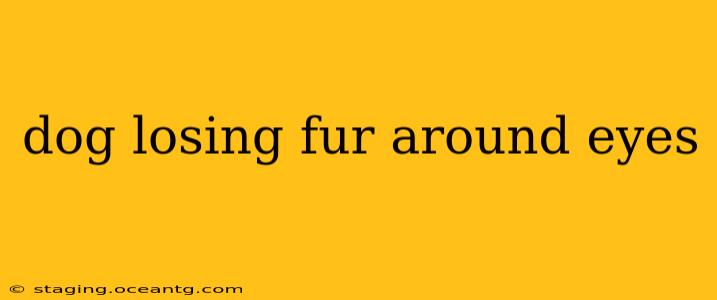Losing fur around the eyes is a common problem for dogs, often causing concern for pet owners. This condition, sometimes called periorbital alopecia, can stem from various factors, ranging from simple allergies to more serious underlying health issues. Understanding the potential causes and seeking veterinary advice is crucial for effective treatment and preventing further hair loss.
Why is My Dog Losing Fur Around Their Eyes?
This is a frequently asked question, and the answer isn't always straightforward. Several factors can contribute to hair loss in this specific area:
-
Allergies: Allergic reactions to environmental allergens (pollen, dust mites, etc.) or food allergies are among the most common culprits. The itching associated with allergies often leads to excessive scratching and rubbing, damaging the hair follicles around the eyes.
-
Infections: Bacterial, fungal, or parasitic infections (like mange) can inflame the skin, resulting in hair loss and potential skin discoloration. Yeast infections are particularly prevalent around moist areas like the eyes.
-
Hormonal Imbalances: Conditions like hypothyroidism (underactive thyroid) can cause hair loss throughout the body, including around the eyes.
-
Nutritional Deficiencies: A lack of essential nutrients can impair hair growth and overall skin health.
-
Trauma: Repeated rubbing or scratching due to eye irritation (from dry eye, for example), or physical trauma, can damage the delicate skin around the eyes and lead to hair loss.
-
Autoimmune Diseases: In some cases, autoimmune disorders attack the hair follicles, causing alopecia.
-
Stress: While less common as the sole cause, chronic stress can contribute to hair loss in dogs.
-
Medication Side Effects: Certain medications can have hair loss as a side effect.
What Should I Do If My Dog is Losing Fur Around Their Eyes?
The most important step is to consult a veterinarian. They can perform a thorough examination to pinpoint the underlying cause of the hair loss. This might involve:
-
Physical Examination: Assessing the skin for redness, inflammation, scabs, or other signs of infection or irritation.
-
Microscopic Examination: Examining skin scrapings under a microscope to check for parasites like mites.
-
Blood Tests: Checking for hormonal imbalances or other systemic diseases.
-
Allergy Testing: Identifying potential allergens.
Can I Treat My Dog's Eye Fur Loss at Home?
While home remedies might offer temporary relief from itching, they should never replace professional veterinary care. Do not attempt to self-diagnose and treat. Improper treatment can worsen the condition. However, your vet might recommend soothing measures in conjunction with prescribed treatments. These could include:
-
Gentle Cleaning: Using a soft cloth and lukewarm water to clean any discharge around the eyes.
-
Avoiding Harsh Chemicals: Keeping the area free of harsh shampoos, perfumes, and other irritants.
What Are the Treatments for Dog Hair Loss Around the Eyes?
Treatment will depend on the underlying cause identified by your veterinarian. Possible treatments include:
-
Medication: Antibiotics, antifungals, or antiparasitic medications for infections.
-
Allergy Management: Dietary changes, allergy shots, or antihistamines for allergies.
-
Hormone Replacement Therapy: For hormonal imbalances like hypothyroidism.
-
Topical Treatments: Creams or ointments to soothe the skin and promote healing.
How Can I Prevent My Dog From Losing Fur Around Their Eyes?
Prevention involves maintaining your dog's overall health and addressing potential risk factors. This includes:
-
Regular Veterinary Checkups: Early detection of potential problems is key.
-
High-Quality Diet: Providing a balanced diet rich in essential nutrients.
-
Regular Grooming: Gentle brushing to prevent matting and remove debris.
-
Maintaining Cleanliness: Regularly cleaning any discharge around the eyes.
-
Managing Allergies: Identifying and avoiding allergens wherever possible.
-
Stress Reduction: Creating a calm and stress-free environment for your dog.
Remember, timely veterinary intervention is crucial when dealing with any form of hair loss in your dog. Ignoring the problem can lead to complications and discomfort for your furry friend. By working closely with your vet, you can get to the root cause and provide the best possible care.
